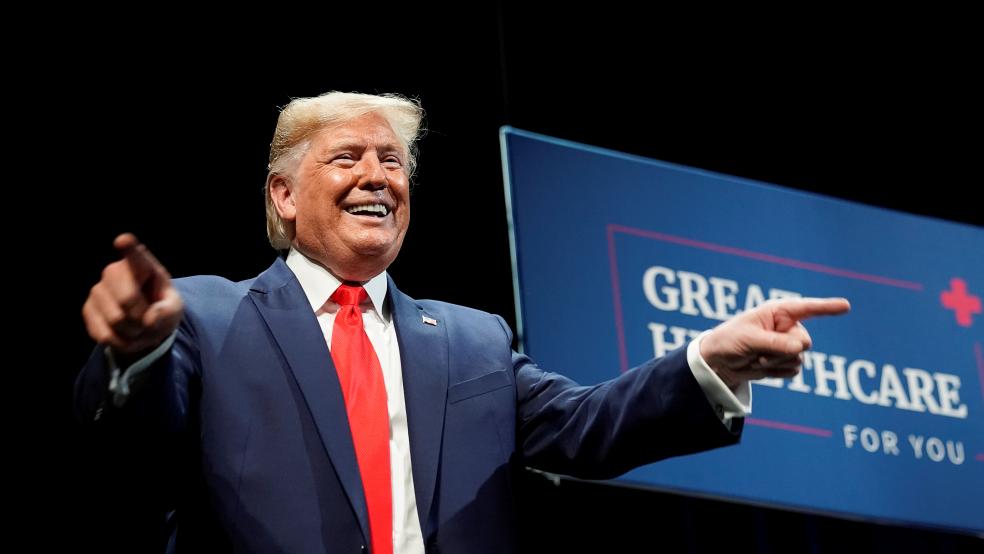In signing an executive order on Medicare Thursday, President Trump sought to portray himself as a protector of the health-care program for seniors.
Trump’s order, which the administration said was aimed at “protecting and improving Medicare,” calls for expanding supplemental benefits offered through private Medicare Advantage plans, increasing use of telehealth services, reducing regulations, eliminating fraud and providing faster access to innovative therapies. (You can find more details about Trump’s speech and executive order here or here.)
None of the changes in Trump’s order will take effect right away, as they all allow for new proposals or rules to be developed over time. But here are four immediate takeaways:
Trump as protector of Medicare might be a problem for conservatives: Ronald Reagan decried Medicare as socialism in the mid-1960s. Now Trump says he is protecting Medicare against socialism in the form of Democratic Medicare-for-All plans. “Trump positioned himself as the guardian of the government healthcare program for seniors that Republicans originally opposed as socialism and have long sought to overhaul,” the Washington Examiner’s Kimberly Leonard notes. “Conservatives generally point out that Medicare faces significant funding problems and that it's one of the biggest drivers of the country's debt.” But Trump’s positioning could undercut future GOP efforts to change Medicare.
Trump didn’t do much to really protect Medicare longer-term: “When asked about how the Trump administration would help assure Medicare's sustainability in the long term, something officials said was part of the president's executive order, health officials pointed to reductions in premiums for prescription drugs and reductions in ‘burdensome’ regulations,” Leonard writes. “Seema Verma, administrator of the Centers for Medicare and Medicaid Services, said on Twitter that overhauling regulations would save almost $6 billion over the next decade.” But Medicare’s projected financing shortfall is much, much bigger than that, totaling some $40 trillion over the next 75 years.
Trump might actually be undermining traditional Medicare: “Trump’s executive order is a stealth attack on the very program he’s swearing to protect,” Los Angeles Times columnist Michael Hiltzik says. “Buried within the order is a provision that would destroy Medicare by driving its costs to an unsustainable level.”
That provision orders the secretary of Health and Human Services to study ways to modify traditional Medicare payments “to more closely reflect” Medicare Advantage and private insurance prices. Larry Levitt of the Kaiser Family Foundation warned on Twitter that the pricing provision “would increase the cost of Medicare enormously, since private insurers pay much higher prices than Medicare.” And Hiltzik argues that “it makes no sense to tie Medicare prices to a market model that so relentlessly inflates costs and thereby collects fatter profits for private participants.”
Similarly, Loren Adler, associate director of the USC-Brookings Schaeffer Initiative for Health Policy, suggests that the language in the Trump executive order reads like its goal “is to make Medicare much, much more expensive by providing a huge windfall to hospitals.” But, he adds, there may be another way to read the order: “The alternative reading here is that the intent is just to apply private insurance prices to Medicare when they're lower, which I hope is the case. We'll see when this study comes out.”
Setting aside that provision, the Trump administration’s push for Medicare Advantage plans raises alarms among some Medicare advocates that it’s pursuing stealth privatization of the traditional health-care program for seniors.
There’s less here than Trump would like you to believe: What Trump laid out was “a fairly normal, fairly vague policy statement with no real implications for 2020,” Axios’s Caitlin Owens writes. Yes, Trump’s push to expand private Medicare Advantage plans over traditional Medicare matters, and it has implications for federal spending, given questions over how effective private Medicare plans are at containing costs. But Trump didn’t announce any new plans to lower drug prices. And he did little to detail an alternative big-picture vision for the U.S. health-care system or to address the broad systemic questions plaguing the health-care industry. “Plenty of what the Trump administration has said is hyperbole, untrue or unknowable,” Owens writes. “And the policy the administration rolled out has little to do with these big-picture issues.”





